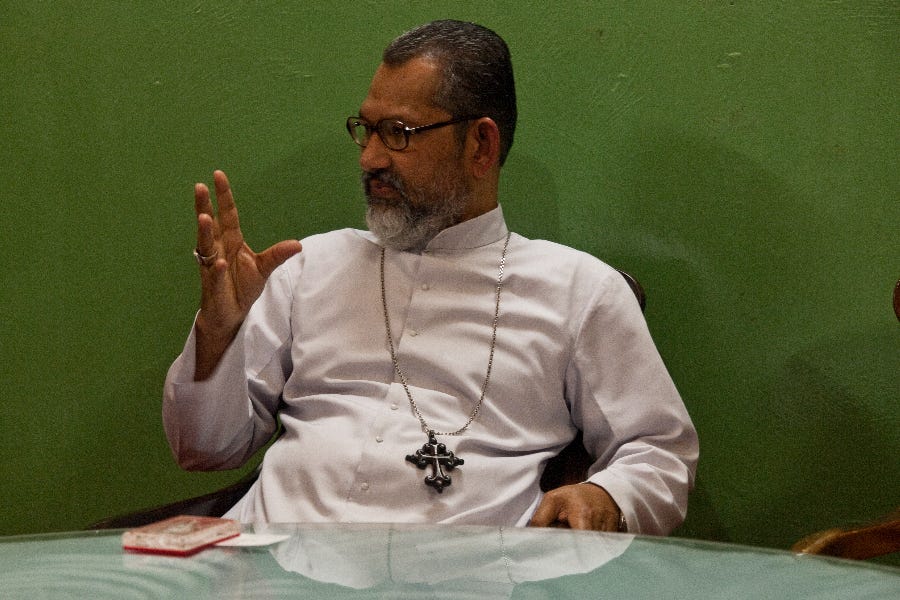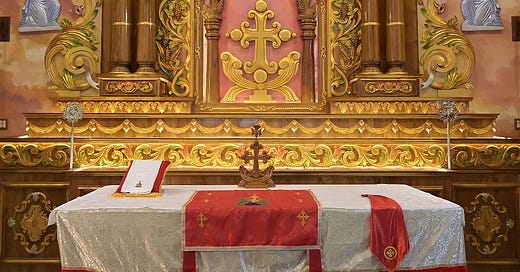
Why are Syro-Malabar Catholics debating the ‘Filioque’ clause?
The second largest Eastern Catholic Church is debating the words of the Creed. But why?
For centuries, Eastern and Western Christians have disputed the Filioque clause, the Latin phrase meaning “and from the Son” that Catholics say when they recite the Creed during the Eucharist on Sundays.
The debate has often been fierce, but in the 21st century it rarely generates headlines. One exception was in 2010, when Pope Benedict XVI visited Britain. A lone protester outside a papal event in London caught the media’s attention with a placard reading “Drop the Filioque!”
Yet there is one part of the Catholic Church where the Filioque clause is currently generating a lively discussion: the Syro-Malabar Church.
What exactly is the fuss over the Filioque clause? Why are Syro-Malabar Catholics debating the phrase? And how does it relate to the intense, decades-long “liturgy war” that continues to roil the Syro-Malabar Church?
The Pillar takes a look.

What’s the fuss over the ‘Filioque’?
To understand the Filioque controversy, it’s important to grasp what the Creed is and how it was shaped in the Church’s first centuries.
A creed is a statement of faith whose profession unites a community of believers. As the Catechism of the Catholic Church notes, “From the beginning, the apostolic Church expressed and handed on her faith in brief formulae normative for all.”
The First Council of Nicaea in 325 was the first ecumenical council — a meeting of bishops representing the whole Church — in Christian history. The council adopted the Nicene Creed, which begins “I believe in one God…”
The First Council of Constantinople in 381 both confirmed the Nicene Creed and adopted an expanded version known as the Niceno-Constantinopolitan Creed.
Catholics worldwide recite the Niceno-Constantinopolitan Creed at Eucharistic liturgies on Sundays and major feast days.
Toward the end of the Niceno-Constantinopolitan Creed, as recited today, is a section devoted to the Holy Spirit, the Third Person of the Holy Trinity. It says:
I believe in the Holy Spirit,
the Lord, the giver of life,
who proceeds from the Father
and the Son,
who with the Father and the Son
is adored and glorified,
who has spoken through the prophets.
In Latin, it reads:
Et in Spiritum Sanctum,
Dominum et vivificantem:
qui ex Patre Filioque procedit.
Qui cum Patre et Filio
simul adoratur et conglorificatur:
qui locutus est per prophetas.
The Catechism of the Catholic Church notes that “the Latin tradition of the Creed” states that the Holy Spirit “proceeds from the Father and the Son (Filioque).”
The Catechism acknowledges that “the affirmation of the Filioque does not appear in the Creed confessed in 381 at Constantinople.” The Creed agreed in 381 said simply that the Holy Spirit “proceeds from the Father.”
The Catechism says that Pope Leo I, who led the Church 440 from 461, had “confessed [the Filioque] dogmatically” in the year 447, following “an ancient Latin and Alexandrian tradition.”
It emphasizes that this occurred “even before Rome, in 451 at the Council of Chalcedon, came to recognize and receive the Symbol of 381.”
(The Creed is sometimes also known as a “Symbol,” a term derived from the Greek symbolon, meaning “token” or “watchword.”)
The Catechism says that the Creed with the Filioque clause was introduced into the Latin liturgy between the 8th and 11th centuries, a development that continues to divide Catholics and Orthodox Christians.
“At the outset, the Eastern tradition expresses the Father’s character as first origin of the Spirit,” the Catechism observes. “By confessing the Spirit as he ‘who proceeds from the Father,’ it affirms that he comes from the Father through the Son.”
“The Western tradition expresses first the consubstantial communion between Father and Son, by saying that the Spirit proceeds from the Father and the Son (Filioque). It says this, ‘legitimately and with good reason,’ for the eternal order of the divine persons in their consubstantial communion implies that the Father, as ‘the principle without principle,’ is the first origin of the Spirit, but also that as Father of the only Son, he is, with the Son, the single principle from which the Holy Spirit proceeds.”
“This legitimate complementarity, provided it does not become rigid, does not affect the identity of faith in the reality of the same mystery confessed.”
So the Catechism asserts that, properly understood, both Catholics and Orthodox Christians express the same fundamental belief in the Holy Trinity despite the difference in the Creed.
But the Catholic Church does not consist solely of the Latin Church. Although the vast majority of Catholics worldwide belong to the Western Church, a significant minority do not. They are members of the 23 Eastern Catholic Churches in full communion with Rome.
The largest of these autonomous (sui iuris) Churches is the Ukrainian Greek Catholic Church. In the Ukrainian Greek Church’s Eucharistic liturgy, known as the Divine Liturgy, the Filioque clause appears in brackets in official texts and is often omitted.
In September 2005, the bishops of the Ukrainian Greek Catholic Church in Canada declared that the Creed would “once again be recited in its original form, that is, without the words ‘and the Son.’”
They said they took the step with the full support of the Ukrainian Catholic Church’s synod of bishops, the Eastern Church’s highest authority.
They added that they also made the move “in support of the Roman Pontiff” — who was then Benedict XVI — noting that the German pope “himself has publicly recited the Creed without the Filioque on several occasions.”
“In doing so, he gives witness to the Church in general, and to the Ukrainian Catholic Church in particular, that the recitation of the Creed in its original form is without prejudice to the Catholic faith,” the bishops said.
(Benedict XVI omitted the Filioque when reciting the Creed together with the Ecumenical Patriarch of Constantinople in 2008. Pope Francis also did so during his 2021 visit to Greece.)
The largest Eastern Catholic Church after the Ukrainian Greek Catholic Church is the Syro-Malabar Church, based in the southern Indian state of Kerala.
In the Syro-Malabar Church’s Eucharistic liturgy, called the Holy Qurbana, the Filioque clause is included in the Creed but placed between two dashes, so it reads:
I believe in the Holy Spirit,
the Lord, the giver of life,
who proceeds from the Father
— and the Son —
who with the Father and the Son
is adored and glorified,
who has spoken through the prophets.

Why are Syro-Malabar Catholics debating the ‘Filioque’?
The March 2024 edition of the Madhyastan Bulletin, a magazine produced by the Syro-Malabar Archeparchy of Changanacherry in southern India, contains a six-page circular letter signed by the archeparchy’s bishop, Mar Joseph Perumthottam.
The letter, written in Malayalam, is dedicated to the Filioque clause — and is raising eyebrows among some Syro-Malabar Catholics.
Perumthottam says that the clause’s separation by hyphens in official Syro-Malabar liturgical texts means that its recitation is optional.
“It is known that there is some discussion on social media about using this option,” he writes. “There are some misinterpretations and statements about this. It confuses many people. This happens because we don’t know the truth behind this expression. So I want to clarify a few things.”
The bishop’s letter, which he asks to be read out in churches, describes the history of the Creed, noting the differences between the Western and Eastern traditions. It recalls that Vatican Council II urged the Eastern Catholic Churches to recover their legitimate liturgical traditions, sometimes lost over centuries of Latinization.
The bishop says that even before the Council, in 1959, the body now known as the Dicastery for the Eastern Churches said in the document “Ordo Celebrationis Quddasa iuxta usum Ecclesiae Syro-Malabarensis” that “the Filioque may be recited or omitted at the discretion of the local bishop.”
Perumthottam suggests that this guidance sought to reconcile two different schools of thought on the Filioque within the Syro-Malabar Church, which uses the ancient East Syriac Rite, but was heavily Latinized following the arrival of European Catholic missionaries in India.
In the bishops’ view, the Vatican formula guaranteed the unity of Catholics worldwide, but recognized that dioceses were able to discern the best course locally.

How does it relate to the Syro-Malabar liturgy dispute?
The tension between Eastern and Western traditions within the Syro-Malabar Church is visible not only in the discussion of the Filioque clause. It is also arguably at the root of its long-running liturgical dispute.
In the beginning, the Syro-Malabar Church followed the ancient practice in which priests faced east (ad orientem) during the Eucharistic liturgy. But after centuries of close contact with Latin Catholics and in the wake of liturgical reforms after Vatican II, priests began to celebrate the liturgy facing the people (versus populum).
Syro-Malabar bishops thought that the different ways of celebrating the liturgy undermined the Eastern Church’s unity. So they supported the creation of a “uniform” liturgy, intended as a compromise between the two approaches.
In the uniform mode of the Holy Qurbana, the priest faces the people at the beginning and end of the celebration, but turns east for the Liturgy of the Eucharist.
The synod of bishops — the Syro-Malabar Church’s authoritative governing body — said in 2021 that all 35 Syro-Malabar eparchies (dioceses) worldwide should adopt the uniform liturgy by the start of Advent that year.
But in the Archeparchy of Ernakulam-Angamaly, the Eastern Church’s largest and most prominent diocese, the majority of priests and lay people rejected the change.
The protest movement has been marked by hunger strikes, street skirmishes, and the burning of cardinals in effigy, as well as clashes inside the archeparchy’s cathedral that led to the building’s closure in December 2022.
Opponents of the new liturgy want the Vatican to recognize the liturgy celebrated facing the people throughout as a legitimate liturgical variant that is in harmony with reforms following Vatican II and firmly established in the Ernakulam-Angamaly archeparchy.
But Rome has insisted that clergy and lay people in the archeparchy accept the change or face possible canonical penalties.
In this tense atmosphere, with the liturgical dispute still unresolved, supporters of the liturgy facing the people have been drawn into the Filioque clause discussion.
Lay people in the Ernakulam-Angamaly archeparchy are asking why, if a bishop has discretion over whether the Filioque should be recited in the Creed, a bishop cannot also decide that celebrating the uniform liturgy is optional. After all, they say, the Creed is more important than a cult, or form of worship.
Fr. Joyce Kaithakottil, a priest of the Archeparchy of Ernakulam-Angamaly, told The Pillar in a March 4 WhatsApp message, that he thought the argument had merit.
“The question raised by the laity is relevant,” he wrote. “If a bishop can option with regard to the recitation of the Creed, why can’t they give an option with regard to a ritual?”
Like the Filioque controversy itself, the debate within the Syro-Malabar Church is unlikely to be resolved any time soon.











Great job, Luke. Solid research, as always. I smiled at the irony of the statement:
"The Catechism says that Pope Leo I, who led the Church 440 from 461, had “confessed [the Filioque] dogmatically” in the year 447, following “an ancient Latin and Alexandrian tradition.”
Since creedal formulas were rarely recited (except at Councils) in the early Church. The first five Ecumenical Councils never obliged that the Symbols be recited at a Sunday Mass. They were confessions, in the early Church, of the orthodoxy and unity of bishops when they gathered.
The Creed is in the Gelasian Missal (in Latin), for the baptism rite. It does *not* have the filioque clause. As you correctly point out, the filioque clause was added in the liturgical missals a century or two later.
From what I understand, several trends led to the adoption of the filioque clause. I wasn't aware the Pope had endorsed it in the fifth century. There were also regional episcopal councils that adopted the filioque as a defense of Christ's divinity. During the time of Charlemagne, there was a push to popularize the use of the filioque in the Creed as it was published in some of the Latin Rite Missals. While there was sound theological basis for the use of the filioque in the West, some historians say Charlemagne pushed for its wide adoption in order to bring Rome into Charlemagne's political orbit, and away from the influence of Constantinople.
Honestly, as a Latin Catholic, I'd be fine with dropping the filioque, and I think it'd be a very good thing for ecumenism and reunification with the Eastern Orthodox (yes, I know that *technically* it's now a resolved matter on paper, but still). I actually see this as the best option all around.
All it would take is a bull from the Pope of Rome saying "We authoritatively declare that the recitation of the filioque in the creed is now suppressed. The Catholic Church maintains her theological position on the Doctrine of the Procession of the Spirit, and this disciplinary directive should not be construed as a reversal of teaching or anything thereabouts. Also, the use of the filioque in artistic liturgical contexts (Classic settings for Masses and other choral arrangements from the past) are permitted." Easy peasy, lemon sqeezy.
Drop the filioque, and then we can tackle the big prize: restoring the discipline of administering the sacraments to align with the Eastern (and actually traditional) arrangement of Baptism, Confirmation/Chrismation, and Eucharist together from birth. The whole "age of reason" thing makes no sense theologically, and was clearly just something convenient Saint Pius X used to justify his reform of sacramental communion practices. When I go to Eastern Catholic Divine Liturgy and my friend's toddler can receive Jesus in the Eucharsit, but my toddler can't, you feel just how wrong this practice is practically and theologically.